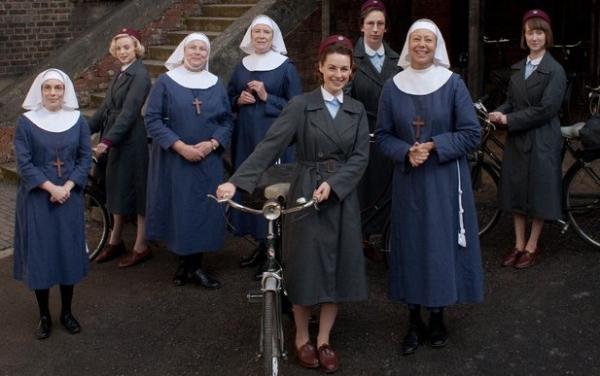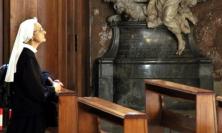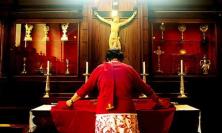The second series of the BBC’s hit show, Call the Midwife, concludes fittingly this Sunday 10 March – Mothering Sunday. Lotte Webb has been extremely moved by the programme and describes here the Ignatian themes that she sees in its storylines and characters. How does Call the Midwife present a model of mission and incarnational theology, where the gritty reality of life reveals the true nature of God, humanity and love?
Call the Midwife is a BBC drama based on the memoirs of the late Jennifer Worth, which document her experiences of nursing and midwifery in the East End of London in the 1950s. It follows the young Jenny Lee (Jennifer Worth’s maiden name) and the midwives and Sisters with whom she lives and works at the nursing convent, Nonnatus House. The voice of the mature Jenny reflects throughout the programme on the fear that led her to the East End and the love that kept her there. She explains that ‘midwifery is the very stuff of life,’ and the viewer sees how this raw experience forms her. As the episodes unfold we see Jenny and her companions encountering poverty and suffering, yet remaining open to the joys, sorrows and challenges of their work. It is a tale of personal growth and of a work of love undertaken with great courage and generosity – each of them is opened by the experience, and the deepest truths are revealed in the everyday, by the people and events of the East End. Call the Midwife is a story of incarnation and birth, not only for the babies of Poplar, but also for the midwives of Nonnatus House, for, ‘every birth is attended by a midwife. She is in the thick of it. She sees it all.’
When we meet Nurse Jenny Lee, she is unprepared either for convent living or the noisy, crowded, unsanitary streets and tenements of Poplar. At the beginning of Episode 1, we see her carrying her suitcase through the streets on her way to her new post at Nonnatus House as the voiceover of her older self describes the experience: ‘I knew nothing of poverty or appalling housing, nothing of lice, of filth, of families sleeping four to a bed, and nothing of the passion than brings on baby after baby, labour after labour. I knew nothing of life itself.’ This double approach of narrative and reflection allows us to experience the unfolding story with the younger Jenny and to benefit from the wisdom of her later life.
Call the Midwife is a story of labour, in every sense of the word. Jenny, the other midwives and the Sisters give themselves wholeheartedly to the work of midwifery and district nursing in the eight square miles they cover. Jenny reflects: ‘I never knew an idle day, a misspent hour, a single moment without some sense of purpose. I could be bone tired and I would rally, exhausted, and bounce back time and again.’ We see the midwives setting off on their bikes at all hours and in all weathers, surviving on little sleep and often missing meals as they answer the call to deliver babies and care for others. Constantly generous and resilient, they extend themselves to their limits: Nurse Trixie and Sister Evangelina scale a rope ladder in the dark up the vertical side of a large cargo ship to deliver a baby; another midwife, Chummy, delivers triplets by the light of her bicycle with neither water nor electricity, and wraps the third-born in her own uniform. Jenny describes her uniform as her ‘armour’ as she travels the East End, for the midwives and Sisters were deeply respected. There was reciprocity in the relationship: ‘we served the women of the East End in their hour of greatest need. In return for our care, they gave us the most precious gift they could … their trust. This made us brave and tireless.’
Birth is an intimate process. Most of the births in the programme take place in the privacy of the home and bedroom, in a space that is reserved for women only. The midwives make a home visit in advance to check for cleanliness and water supplies, and then send a home delivery pack in preparation. Sometimes they are called to births in other places – the cargo ship, for example, or a communal toilet or even a fish smokehouse – but wherever it happens, through the rupture of bodies and screaming and blood, something sacramental is at work and a new life is born. The mature Jenny reflects, ‘Birth was and will always be the most commonplace of miracles, an event at once familiar and phenomenal, timeless and immediate, briefly making angels of us all.’
The strength and courage of the mothers and their love for their babies is woven through every episode. We see the power of mothering as a woman struggles to keep her premature son alive, against all the odds, through sheer force of love. We meet a mother whose rachitic pelvis had led to obstructed births and stillborn children; yet with the support of the midwives and Sisters in the ante-natal clinic, and a subsequent Caesarean section, she gives birth to a healthy daughter whom she names Grace Miracle. We see the joy of new life and hope: ‘newborns are always beautiful. They cannot fail to make the heart sing, for even the plainest faces are alive with promise.’
As the midwives grow into their role, so they also grow as women. The pain of accompanying patients facing loss and death prompts the young Nurse Cynthia to say with courage: ‘we have a duty to live every moment the best we can. I mean, really live it.’ Perhaps Chummy, more than any other character, embodies this growth towards the fullness and generosity of her humanity. When Chummy arrives she is so large that she does not fit into any of the uniforms available. Undaunted, she simply stays up all night and makes herself a uniform that fits. She has never learnt to ride a bicycle, and while her struggle to master the art provides lightness and comedy, we also see a determined woman who can fall off a bike time and again and not give up until she can ride. In the second series, Chummy makes a courageous decision to answer her missionary vocation to Sierra Leone because she feels that God is calling her there, although it means leaving behind the place where she has been happiest. She knows that life in Nonnatus House and her marriage to Constable Peter Noakes have made this possible: ‘The only reason I’m even half brave enough to go is because of you. You’ve shown me I have something to offer the world.’
Community life at Nonnatus House forms the backdrop to life for the midwives and Sisters and their extended community. It is a place of welcome and acceptance, where the lay midwives and nuns share a common mission, working, eating and living together. We witness conversations around the meal table, the sharing of cake and the struggle to live peaceably with those they would never have chosen. Cynthia, Trixie, Jenny and Chummy form strong friendships, and we see them dancing and socialising. When Cynthia faces the trauma of an infant death, the others cover her work without question. There is support, trust and companionship, and eccentricities are encompassed readily. We see also the nuns at recreation, and at the work of prayer.
Prayer underpins the vocation of the Order of St Raymond Nonnatus . The Sisters rise early each morning for the Divine Office. An atmosphere of mystery pervades the convent, particularly in Advent when their meditation creates an expectant, joyous calm which stands in contrast to the chaos beyond their doors. We see Jenny washing the Bambino for the Crib while the nuns pray, as she washes the newborns in her daily round. And when she sets out into the smog to deliver a baby, it is Sister Julienne’s blessing, ‘God be with you’ that gives her strength. In addition to our glimpses of the nuns at prayer, we see others seeking the stillness of the chapel occasionally. But more often we hear the Sisters’ singing interspersed with times of danger or sorrow or need. The haunting plainchant of Psalm 51 accompanies a home abortion by a desperate mother, while a compline hymn is sung during the diminishment of a war veteran and the Nunc Dimittis at his death. It seems the Sisters hold before God not only the needs of expectant mothers in the East End, but the joy and suffering of all human life.
There is no gloss over poverty and pain. Suicide, abortion, prostitution, abuse, exploitation and untimely death all have their place in the story. We see a young girl alone giving birth in an empty building in the dark. We hear the ‘workhouse howl’ expressing the unspeakable grief of Mrs Jenkins, who had lost all five of her children. Loss and change are as inevitable as the tides, and Sister Evangelina advises, ‘Sometimes, you have to admit defeat and let the world turn as it must.’ Even in the convent itself, we see Sister Monica Joan’s struggle with diminishment, as she recognises that the times of being ‘useful’ and ‘important’ have passed. Yet in the face of loss and suffering, Jenny learns that, ‘just as the swan’s last song is the sweetest of its life, so loss is made endurable by love.’
Love is at the heart of Call the Midwife. Something profound and holy is at work as Jenny and Sister Evangelina wash Mrs Jenkins. Over time they have befriended this frail woman and earned her trust to the point that she allows them to wash her and provide her with new clothes. They fill a tin bath in the centre of the condemned building where she lives, and carefully undress and wash her. This is done with the utmost dignity and tenderness, while we hear the singing of ‘O Come, O Come Emmanuel’. Such work is at the heart of the incarnation and the mystery of love. The reconciliation of an estranged daughter and her dying father is made possible by the healing power of touch and the birth of a grandson. It is Jacob, a resident in a local asylum, who speaks the truth which enables a couple to love and nurture their disabled son. But above all it is Joe, the war veteran with his ulcerated wounds and open heart, who teaches Jenny the meaning of love: ‘I had begun to see what love could do … Love had the power to break hearts and to save. Love was like midwifery – the very stuff of life.’
The backdrop of the Docklands, with the constant coming and going of ships and cargo and shifting waters, mirrors the thresholds of birth and death, love and loss which underpin the drama. The poverty of London’s East End in the 1950s is not glamorised, but in the midst of it hope is found. In a mysterious way it is the people of the East End who bring the midwives to birth. The older Jenny reflects: ‘It seems to me, gazing back across the decades, that my journey into womanhood began on the streets of East London.’ Experience meets reflection – that most Ignatian of themes – and we are invited into the reflection, to let our own stories merge with theirs through light and darkness, love and loss, poverty and hope, community and labour, birth and death; God is indeed found in all things. Jenny stands on a bridge looking out over the Thames, the water moving irrevocably towards the sea. She reflects on the life she has encountered : ‘In the East End, I found grace and faith and hope, hidden in the darkest corners. I found tenderness and squalor and laughter amid filth. I found a purpose and a path and I worked with a passion for the best reason of all. I did it for love.’
Lotte Webb is a Community Chaplain in a Young Offenders' Prison and will soon take up the post of Lay Chaplain at St Ignatius College, Enfield.






